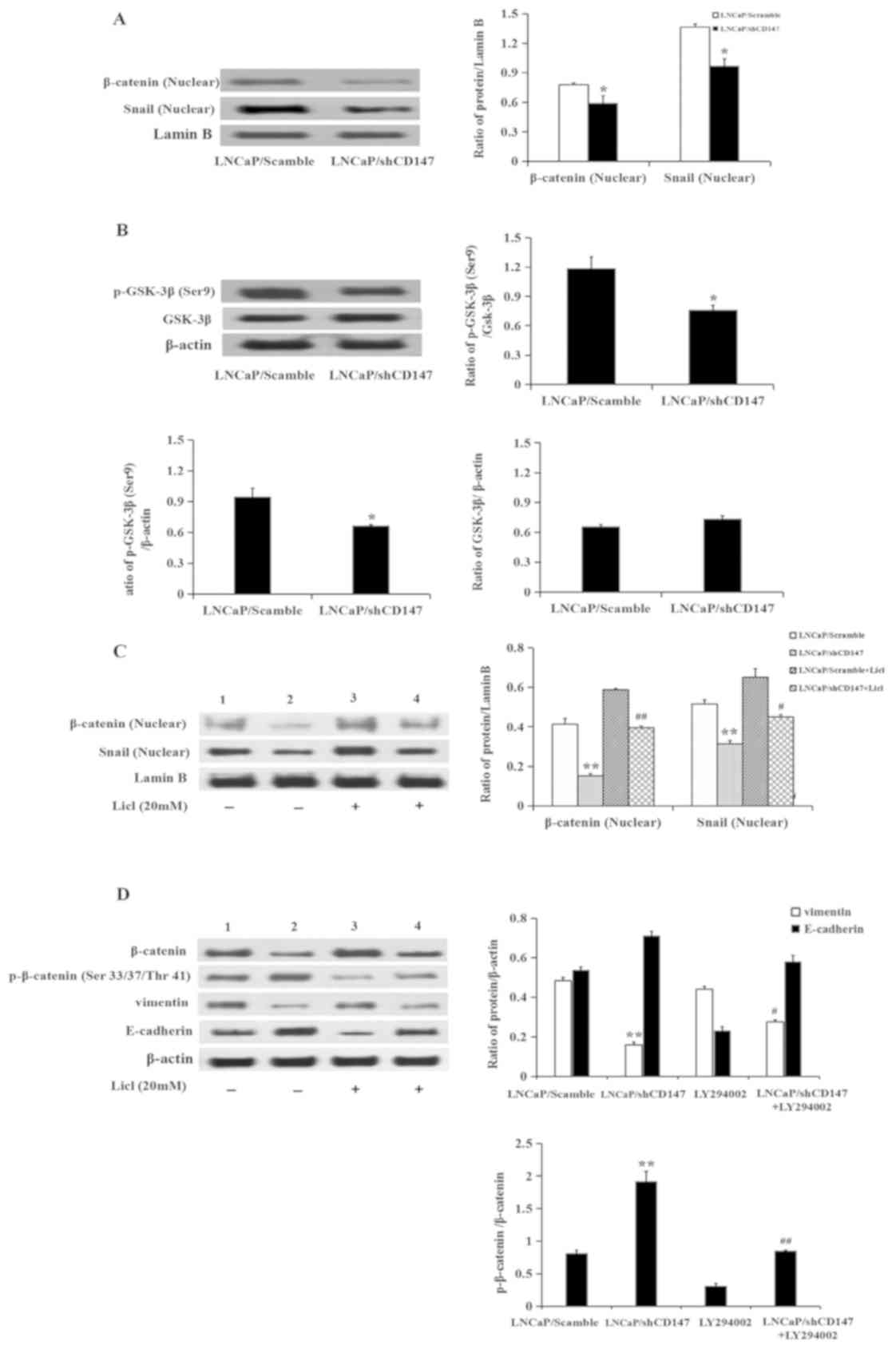|
1
|
Ibrahim T, Flamini E, Mercatali L, Sacanna
E, Serra P and Amadori D: Pathogenesis of osteoblastic bone
metastases from prostate cancer. Cancer. 116:1406–1418.
2010.PubMed/NCBI View Article : Google Scholar
|
|
2
|
Roodman GD: Mechanisms of bone metastasis.
N Engl J Med. 350:1655–1664. 2004.PubMed/NCBI View Article : Google Scholar
|
|
3
|
Bubendorf L, Schopfer A, Waqner U, Sauter
G, Moch H, Willi N, Gasser TC and Mihastsch MJ: Metastatic patterns
of prostate cancer: An autopsy study of 1,589 patients. Hum Pathol.
31:578–583. 2000.PubMed/NCBI View Article : Google Scholar
|
|
4
|
Siegel RL, Miller KD and Jemal A: Cancer
statistics, 2018. CA Cancer J Clin. 68:7–30. 2018.PubMed/NCBI View Article : Google Scholar
|
|
5
|
Tiwari N, Gheldof A, Tatari M and
Christofori G: EMT as the ultimate survival mechanism of cancer
cells. Semin Cancer Biol. 22:194–207. 2012.PubMed/NCBI View Article : Google Scholar
|
|
6
|
Seton-Roqers S: Epithelial-mesenchymal
transition: Untangling EMT's functions. Nat Rev Cancer.
16(1)2016.PubMed/NCBI View Article : Google Scholar
|
|
7
|
Coopman P and Djiane A: Adherens Junction
and E-Cadherin complex regulation by epithelial polarity. Cell Mol
Life Sci. 73:3535–3553. 2016.PubMed/NCBI View Article : Google Scholar
|
|
8
|
Serrano-Gomez SJ, Maziveyi M and Alahari
SK: Regulation of epithelial-mesenchymal transition through
epigenetic and post-translational modifications. Mol Cancer.
15(18)2016.PubMed/NCBI View Article : Google Scholar
|
|
9
|
Chien MH, Lin YW, Wen YC, Yang YC, Hsiao
M, Chang JL, Huang HC and Lee WJ: Targeting the SPOCK1-snail/slug
axis-mediated epithelial-to-mesenchymal transition by apigenin
contributes to repression of prostate cancer metastasis. J Exp Clin
Cancer Res. 38(246)2019.PubMed/NCBI View Article : Google Scholar
|
|
10
|
Seol MA, Kim JH, Oh K, Kim G, Seo MW, Shin
YK, Sim JH, Shin HM, Seo BY, Lee DS, et al: Interleukin-7
contributes to the invasiveness of prostate cancer cells by
promoting epithelial-mesenchymal transition. Sci Rep.
9(6917)2019.PubMed/NCBI View Article : Google Scholar
|
|
11
|
Sun Y, Wang BE, Leong KG, Yue P, Li L,
Jhumjhunwala S, Chen D, Seo K, Modrusan Z, Gao WQ, et al: Androgen
deprivation causes epithelial-mesenchymal transition in the
prostate: Implications for androgen-deprivation therapy. Cancer
Res. 72:527–536. 2012.PubMed/NCBI View Article : Google Scholar
|
|
12
|
Bi XC, Liu JM, Zheng XG, Xian ZY, Feng ZW,
Lou YX, Zhong WD and Wu CL: Over-expression of extracellular matrix
metalloproteinase inducer in prostate cancer is associated with
high risk of prostate-specific antigen relapse after radical
prostatectomy. Clin Invest Med. 34(358)2011.PubMed/NCBI View Article : Google Scholar
|
|
13
|
Wang L, Wu G, Yu L, Yuan J, Fang F, Zhai
Z, Wang F and Wang H: Inhibition of CD147 expression reduces tumor
cell invasion inhuman prostate cancer cell line via RNA
interference. Cancer Biol Ther. 5:608–614. 2006.PubMed/NCBI View Article : Google Scholar
|
|
14
|
Grass GD, Dai L, Qin Z, Parsons C and
Toole BP: CD147: Regulator of hyaluronan signaling in invasiveness
and chemoresistance. Adv Cancer Res. 123:51–73. 2014.PubMed/NCBI View Article : Google Scholar
|
|
15
|
Szubert S, Szpurek D, Moszynski R, Nowicki
M, Frankowski A, Sajdak S and Michalak S: Extracellular matrix
metalloproteinase inducer (EMMPRIN) expression correlates
positively with active angiogenesis and negatively with basic
fibroblast growth factor expression in epithelial ovarian cancer. J
Cancer Res Clin Oncol. 140:361–369. 2014.PubMed/NCBI View Article : Google Scholar
|
|
16
|
Fang F, Qin Y, Hao F, Li Q, Zhang W, Zhao
C, Chen S, Zhao L, Wang L and Cai J: CD147 modulates androgen
receptor activity through the Akt/Gsk-3β/β-catenin/AR pathway in
prostate cancer cells. Oncol Lett. 12:1124–1128. 2016.PubMed/NCBI View Article : Google Scholar
|
|
17
|
Livak KJ and Schmittgen TD: Analysis of
relative gene expression data using real-time quantitative PCR and
the 2(-Delta Delta C(T)) method. Methods. 25:402–408.
2001.PubMed/NCBI View Article : Google Scholar
|
|
18
|
Arvelo F, Sojo F and Cotte C: Tumor
progression and metastasis. Ecancermedicalscience.
10(617)2016.PubMed/NCBI View Article : Google Scholar
|
|
19
|
Xu Q, Deng F, Qin Y, Zhao Z, Wu Z, Xing Z,
Ji A and Wang QJ: Long no-coding RNA regulation of
epithelial-mesenchymal transitiion in cancer metastasis. Cell Death
Dis. 7(e2254)2016.PubMed/NCBI View Article : Google Scholar
|
|
20
|
Xu T, Zhou M, Peng L, Kong S, Miao R, Shi
Y, Sheng H and Li L: Upregulation of CD147 promotes cell invasion,
epithelial-to-mesenchymal transition and activates MAPK/ERK
signaling pathway in colorectal cancer. Int J Exp Pathol.
15:7432–7441. 2014.PubMed/NCBI
|
|
21
|
Wu X, Qiao B, Liu Q and Zhang W:
Upregulation of extracellular matrix metalloproteinase inducer
promotes hypoxia-induced epithelial-mesenchymal transition in
esophageal cancer. Mol Med Rep. 12:7419–7424. 2015.PubMed/NCBI View Article : Google Scholar
|
|
22
|
Ru NY, Wu J, Chen ZN and Bian H:
HAb18G/CD147 is involved in TGF-β-induced epithelial-mesenchymal
transition and hepatocellular carcinoma invasion. Cell Biol Int.
39:44–51. 2015.PubMed/NCBI View Article : Google Scholar
|
|
23
|
Lin Y, Dong C and Zhou BP: Epigenetic
regulation of EMT: The snail story. Curr Pharm Des. 20:1698–1705.
2014.PubMed/NCBI View Article : Google Scholar
|
|
24
|
Wu G, Xu G, Schulman BA, Jeffirey PD,
Harper JW and Pavletich NP: Structure of a
beta-TrCP1-Skp1-beta-catenin complex: Destruction motif binding and
lysine specificity of the SCF (beta-TrCP1) ubiquitin ligase. Mol
Cell. 11:1445–1456. 2003.PubMed/NCBI View Article : Google Scholar
|
|
25
|
Wang QM, Fiol CJ, Depaoli-Roach AA and
Roach PJ: Glycogen synthase kinase-3 beta is a dual specificity
kinase differentially regulated by tyrosine and serine/threonine
phosphorylation. J Biol Chem. 269:14566–14574. 1994.PubMed/NCBI
|



















